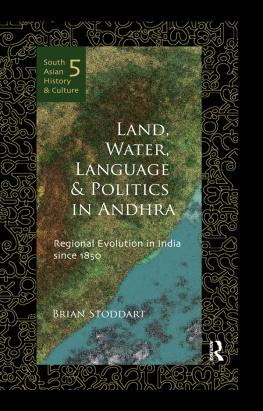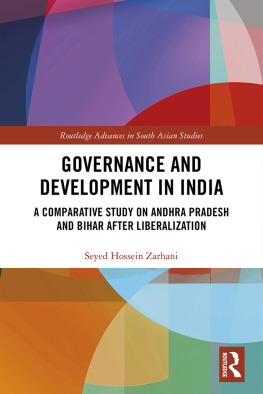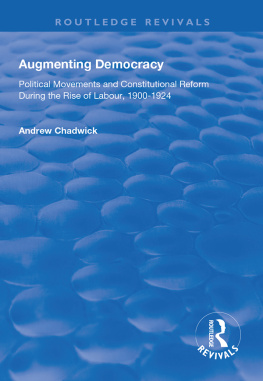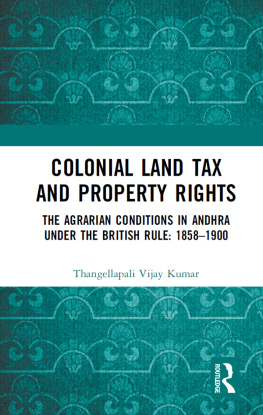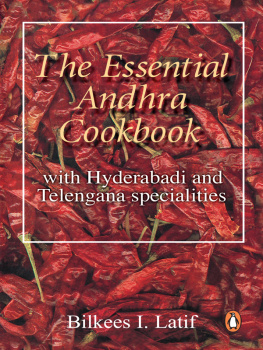Land, Water, Language and Politics in Andhra
South Asian History and Culture
Series Editors:
David Washbrook, University of Cambridge, UK
Boria Majumdar, University of Central Lancashire, UK
Sharmistha Gooptu, South Asia Research Foundation, India
Nalin Mehta, Institute of South Asian Studies, National University of Singapore
This series brings together research on South Asia in the humanities and social sciences, and provides scholars with a platform covering, but not restricted to, their particular fields of interest and specialisation.
A significant concern for the series is to focus across the whole of the region known as South Asia, and not simply on India, as is often the case. We are most conscious of this gap in South Asian studies and work to bring into focus more scholarship on and from Pakistan, Bangladesh, Sri Lanka, Nepal and other parts of South Asia. At the same time, there will be a conscious attempt to publish regional studies, which will open up new aspects of scholarly inquiry going into the future.
This series will consciously initiate synergy between research from within academia and that from outside the formal academy. A focus will be to bring into the mainstream more recently developed disciplines in South Asian studies which have till date remained in the nature of specialized fields: for instance, research on film, media, photography, sport, medicine, environment, to mention a few. The series will address this gap and generate more comprehensive knowledge fields.
Also in this Series
How Best Do We Survive? A Modern Political History of the Tamil Muslims
Kenneth McPherson
978-0-415-58913-0
Health, Culture and Religion in South Asia: Critical Perspectives
Editors: Assa Doron and Alex Broom
978-81-89643-16-4
Gujarat Beyond Gandhi: Identity, Conflict and Society
Editors: Nalin Mehta and Mona Mehta
978-81-89643-17-1
Indias Foreign Relations, 1947-2007
Jayanta Kumar Ray
978-0-415-59742-5
First published 2011
by Routledge
912 Tolstoy House, 15-17 Tolstoy Marg, Connaught Place, New Delhi 110 001
Simultaneously published in the UK
by Routledge
2 Park Square, Milton Park, Abingdon, OX14 4RN
Routledge is an imprint of the Taylor & Francis Group, an informa business
2011 Brian Stoddart
Typeset by
Bukprint India
B-180A, Guru Nanak Pura, Laxmi Nagar
Delhi 110 092
All rights reserved. No part of this book may be reproduced or utilised in any form or by any electronic, mechanical or other means, now known or hereafter invented, including photocopying and recording, or in any information storage and retrieval system without permission in writing from the publishers.
British Library Cataloguing-in-Publication Data
A catalogue record of this book is available from the British Library
ISBN: 978-0-415-67795-0
Contents
This core of this book began as a PhD thesis, from which I published an article on Civil Disobedience in Andhra, I was stimulated to return both to the original work and to the substantial additional research I had done subsequently, the aim being to draw a broader picture of a region and a tradition still somewhat underdone in the historical literature.
The picture drawn here is still an incomplete sketch rather than a masterpiece, but by putting the original material into the broader canvas, hopefully something of Andhras distinction and distinctiveness emerges, especially in a period when the region is yet again being redefined. That distinctiveness captured me while doing the original work because it seemed such a different pattern from that emerging in Tamil Nadu, which region provided the other half of my research focus. A lot of historiographical water has passed under the bridges of the Kistna and Godavari and all of Indias other major rivers since I produced the original thesis. Most notably the Subaltern Studies school, with which I had something to do in its earlier stages and whose major players I know and respect, transformed the way in which colonial subjects were analysed. Some of that analytical change is reflected in this fuller work, some of it is not, and others will have their own views about the results. Similarly, India is now very different from the place I first encountered, and in some ways the story here indirectly helps explain something of why that happened-change and continuity are the themes of historical analysis anywhere.
My interest in India was stimulated first by the late Ian Catanach at the University of Canterbury, and he remains the most inspirational small group teacher I ever encountered. He was later instrumental in getting me to the University of Western Australia where my primary supervisor was Hugh Owen, and where Peter Reeves soon arrived to further energise the considerable group of South Asianists there. My first teaching position was at what is now Curtin University where I joined John McGuire and the late Ken McPherson, and while we taught other things India was never far off in the equation. During that period I was impressed and inspired by a wide range of people including Robin Jeffrey, Ranajit Guha, Dipesh Chakrabarty, Gyan Pandey, Sumit Sarkar, David Arnold, and many others. Then I went off to write about sport, and then went into university management, but India remained as a strong subtext and interest.
More recently I have returned to India via the indefatigable Boria Majumdar, who has introduced me to an even wider range of people and ideas, principally in the world of sport but inevitably also across a wider plane. This phase has included my writing for various Indian magazines, and for the blog I have enjoyed doing for South Asia Masala at the Australian National University, where Sandy Gordon and my former student Auriol Weigold have encouraged me to write on a wide range of subjects. It has also involved re-establishing a strong link with David Washbrook whose work on south India has been so influential. We were once apparently on opposite sides of a theoretical fence, but looking back now I am not exactly sure how, because we seem to have far more in common than in division.
In large part my ongoing India connection was maintained through writing the now-completed biography of A. M. A. C. Galletti, a renegade Madras Indian Civil Service man whose career exception proved the rule in many ways. He discovered me in the Madras archives, and the quest for Galletti put me into a different realm of India and maintained my connections over a long period. Revealing him took me back to the period of this book, which in turn led me to this present completion. Peter Reeves, Robin Jeffrey and Ken McPherson all urged me to finish Galletti, and in so doing they were instrumental in this work being finished, too, so I thank them sincerely.
Along the way I benefited from all the usual range of archives and libraries and the people who make them workable: the National Archives of India, the Andhra Pradesh Archives, the Tamil Nadu Archives, the Nehru Memorial Museum and Library, the India Office Records now at the British Library, the South Asia Archive at Cambridge, the Bodleian at Oxford, the Reid Library at the University of Western Australia, the National Library of Australia, the Australian National University Library, the Victorian State Library, and others.
Indirectly, I owe a great deal to the family of Arthur Galletti: particularly his daughter Emma; grandson Pascal Ricketts, his wife Sally and their daughters Beatrice and Anna; granddaughter Elizabeth Skinner and her brother William de Bruyn; grandsons Ian and David Galletti; and particularly granddaughter Antoinette Moat and her husband John. By welcoming me into their family and homes, they took me back to south India in their photographs, papers and memories. It has been a privilege to know them and to become friends.

